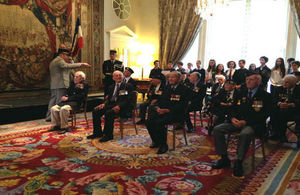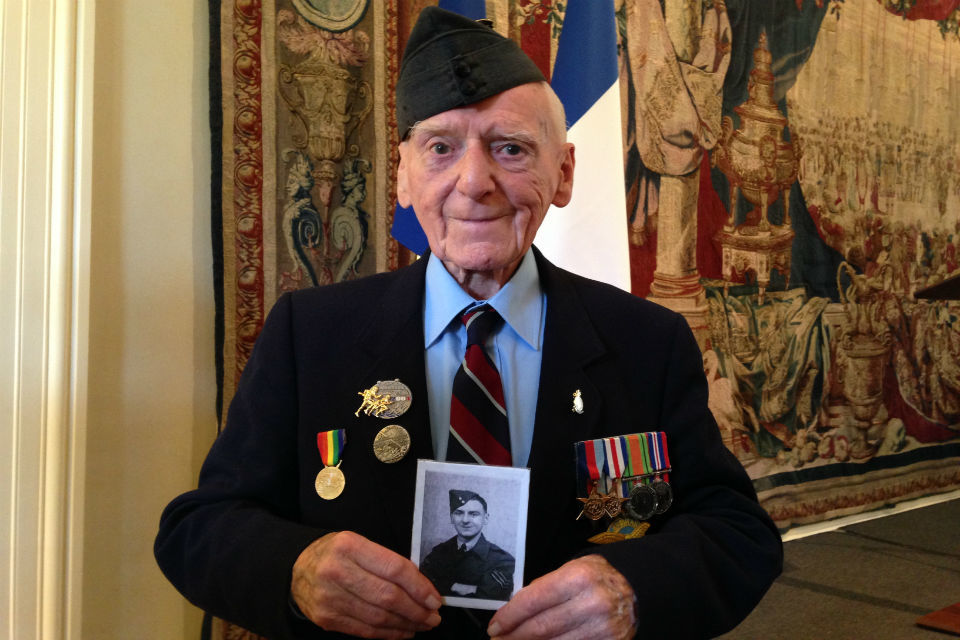British D-Day veterans receive Légion d’honneur award
15 British veterans were presented with France’s highest honour for their role in liberating the country in the Second World War.

British veterans at the service today
A group of 15 British veterans have received France’s highest honour today for their role in the liberation of the country during the Second World War.
French Veterans Minister Jean-Marc Todeschini presented the Légion d’honneur to the veterans, many of whom took part in the D-Day landings in June 1944.

Bernard Morgan was one of those to receive the Légion d’honneur
RAF code breaker Bernard Morgan, 91, was among those to receive the medal.
Mr Morgan said: “I feel very honoured to be considered for the Légion d’honneur, and to receive it from the French government.”
Mr Morgan described landing on Gold Beach at 6.30pm on 6 June 1944, aged 20, in his diary at the time:
I shall never forget seeing the beach littered with many dead bodies, some of whom had been shot or drowned and others carried in by the incoming tide. A very sad sight, never to be forgotten by a young 20-year-old airman seeing his first dead body.
The first night on land was a nightmare. We slept or tried to sleep, underneath our vehicles for some protection from continuous cross fire from the heavily fortified Atlantic Wall, which was blistering with guns. All night the sky was lit by tracers and heavy gunfire. We were glad to have survived a memorable day and felt very lucky to be alive.
The former Sergeant volunteered to join the RAF on his 18th birthday but was not called up until July 1942. He served in the Code and Cypher Section of 83 Group Control Centre, part of the 2nd Tactical Air Force, from September 1943 until the end of the war.
While his boat was on its way to Normandy, D-Day was put back a day because of the bad weather. They arrived off the coast too soon and were seven miles off the coast of Normandy on the night of 5 June.
Mr Morgan, who is said to have been the youngest RAF Sergeant there, said:
Behind us were the British and Allied battle ships firing at the Germans, and they were firing back. We were under that canopy. For two hours during the night I had to man a bren gun on the deck.
I was very frightened sat on that deck. We didn’t know what expect. It was a lottery whether your landing craft would go up in smoke.
Minister of State for Defence in the House of Lords, Earl Howe, said:
It is a pleasure today to mark the courageous contributions of British D-Day veterans, who fought to keep Britain, France and their allies safe.
On behalf of the Government I would like to thank the French people for their decision to recognise so generously the sacrifices of British men and women who fought to liberate their country more than 70 years ago.
We know that everyone involved is doing their very best to ensure that veterans receive their awards as soon as possible and I am delighted that we are now seeing the results of this work.
Jean-Marc Todeschini, French Minister of State for Veterans and Remembrance, said:
It is my honour to be presenting these British World War II veterans with the Légion d’honneur, and I do so with a great deal of respect and gratitude.
To these men, France owes its liberation. We will never forget their bravery over 70 years ago, which led to freedom and peace in France and across Europe.
Thomas Hassall was 18 when he landed on Juno beach on the evening of D-Day.
Mr Hassall, now 89, said:
I think it is a very great honour, not only for me but for the fellows that didn’t come back. And for my friends that I made on the way; I receive it on their behalf as well.
I am not a chap who likes a fuss but I appreciate everything that has been done.
Mr Hassall – then a Private – was one of the first reinforcements to arrive in France on 6 June 1944 in the largest amphibious assault in history. He added:
It is only in recent years that I’ve been able to talk about this now. It seems to come easier as time passes
He remembered jumping off the landing craft into water up to his elbows.
Mr Hassall said:
My biggest memory is coming out of the water, scrambling up the damaged vehicles and tanks.
It appeared to me that it was organised chaos. Each unit had to find their own way. We landed and assembled in a field and shells and mortars were raining down, causing us to dive into the ditch.
We were just concerned with keeping ourselves going. All I remember is this grass field – I can see it now, just beyond the landing area. You just had to get on with it.
Mr Hassall and his West Yorkshire regiment were transferred to the fourth Battalion Lincolnshire Regiment three days later and spent the rest of the campaign on the front line, advancing and digging in. Their main objective was to move up the coast with the Canadian tanks to free up the ports so the British could land equipment. He also fought in the Battle of Arnhem, Operation Market Garden and was part of the first section to cross the river into Arnhem.
The ceremony was the latest in a number of special commemorations that have taken place since the 70th anniversary of D-Day in June 2014, when President François Hollande pledged to honour all those British veterans who had served in France during the war.